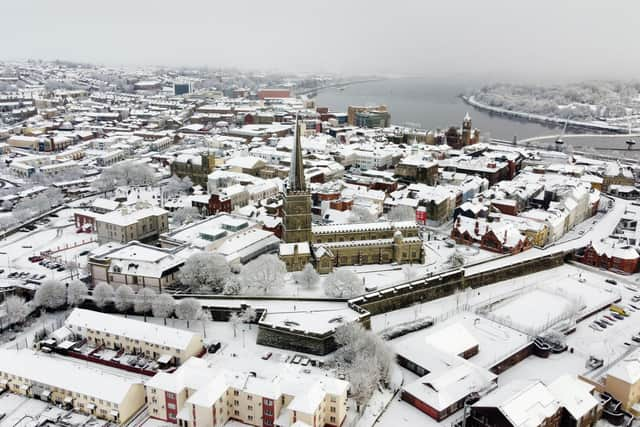Snow warning: Northern Ireland is set for a long period of cold weather
and live on Freeview channel 276
A yellow warning is in place today and tomorrow for snow and ice and on Thursday and Friday heavy snow is forecast.
Temperature of minus six degrees are likely in the days ahead as cold Arctic air travels south across the UK and Ireland.
Advertisement
Hide AdAdvertisement
Hide AdWidespread frost is expected but snow is only likely on higher ground and towards the north coast during the course of the first yellow warning which begins at 9pm tonight and extends until 10am tomorrow (Tuesday).


However the second warning, in force from 3am on Thursday to 6pm on Friday, could see snowfall measuring between five and 10 centimetres in some areas, even at low levels.
The Met Office said that stronger winds could lead to blizzard-like conditions in some places.
Graham Madge from the Met Office commented that conditions could be similar to those experienced during the cold snap in December 2022 and may not lift for almost a fortnight.
Advertisement
Hide AdAdvertisement
Hide Ad“Temperatures will be much, much colder than we would expect at this time of year,” he said.
“The pattern will set in for some time. We have got this feed of cold air coming in from a much higher latitude.
“We expect these conditions to remain in place until at least next weekend and possibly longer because sometimes these conditions can be quite stubborn and not easily subject to change.”
The Met Office warned that travel disruption is likely and journey times by car, train and bus may take longer than usual.
Advertisement
Hide AdAdvertisement
Hide AdPeople are at risk of slipping and falling on icy patches of untreated roads, pavements and paths while some rural communities could become cut off from the power grid.
Mr Madge said: “This is a disruptive spell of weather which could have quite serious consequences for some.
“Listen to the forecast, take account of weather warnings and expect to see some potentially disruptive conditions wherever you are.”
The coldest temperature recorded last March was minus 9.1 in Aboyne, Aberdeenshire while on March 14 1958 the mercury dropped to a record low of minus 22.8 at Logie Coldstone, Aberdeenshire.